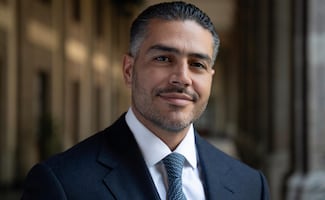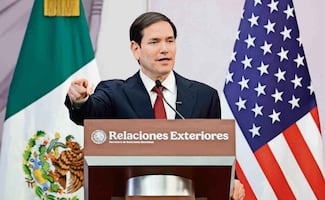Más Información

New York Times destaca rol de Harfuch en el combate del narco; resalta intercambio de inteligencia con EU

Marco Rubio destaca labor de seguridad de México; "están haciendo más que nunca en su historia", afirma

"Queremos cerrar este capítulo", dice Salinas Pliego al SAT; esperarán a enero a conocer fundamentos legales de adeudo fiscal
Actor and filmmaker Gael Garcia Bernal called on Tuesday for the United Nations and governments around the world to put pressure on his native Mexico to end impunity for corruption and large-scale killings.
Activists and U.N. investigators have accused Mexican security forces of crimes including murder, torture and disappearances since the military was sent to tackle its powerful drug cartels in 2007. More than 100,000 have died in drug violence in the decade since.
Mexico is also experiencing its worst-ever surge in violent crime, with more than 25,000 killings in 2017, a rate of nearly 21 per 100,000 people. The run-up to a presidential election in July has been marred by violence.
“Elections are coming, stakes are pretty high. This is the moment, the moment to overturn things,” Garcia Bernal, 39, told a news conference in Geneva, where he is to address the U.N. Human Rights Council on Wednesday.
“I don’t want to go into my 40s thinking that I am going to have systematic violence, systematic impunity in my country.”
Crime not being prosecuted is linked to “corruption on a broad scale,” he told a panel on Mexico held at the United Nations.
Garcia Bernal later attended a documentary, “Devil’s Freedom,” by Everardo Gonzalez, at the International Film Festival and Forum on Human Rights (FIFDH) .
In the film, victims and former soldiers who killed civilians on orders, testified anonymously about daily violence. All wore tight flesh-coloured masks as they confessed either anguish about missing loved ones or how they shot entire families in cold-blood.
“It is an important film ... That’s what documentaries are for, they challenge official discourse,” Garcia Bernal said in the debate afterwards entitled, “Mexico: Towards the End of Impunity?”
“Maybe we should think about legalisation of drugs. There is still an absurd stigma about marijuana. These are things we need to challenge,” he said.
Asked what he would tell the U.N rights forum, where Mexico is among the 47 member states, Garcia Bernal told reporters, “To interact with Mexican society, with the victims, with the Mexico institutions, with the governmental institutions and to put pressure definitely on Mexico.
“When the eyes of the world say and portray or signal something that’s wrong in Mexico, that is the only moment that politicians do something in Mexico,” he said.
There was a “debt to all the victims” , Garcia Bernal said, adding, “We have a lost generation in that sense.”
bg
Noticias según tus intereses
[Publicidad]
[Publicidad]











